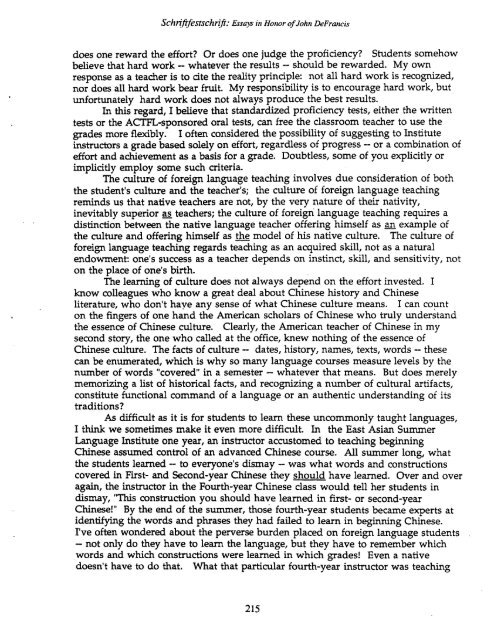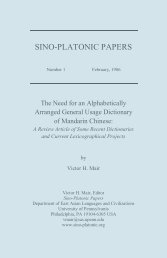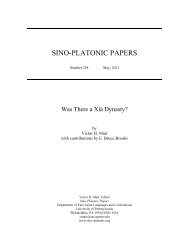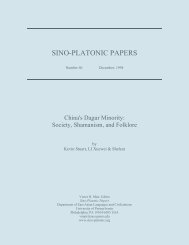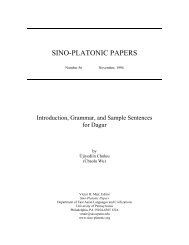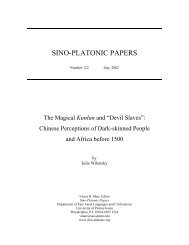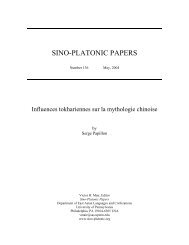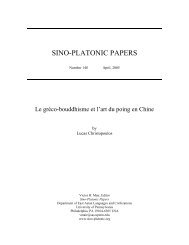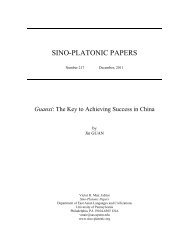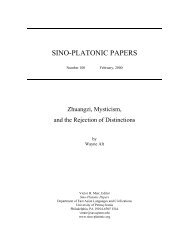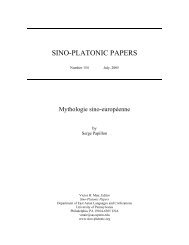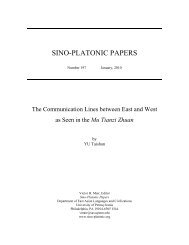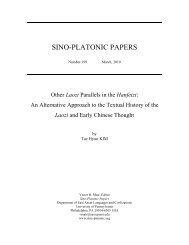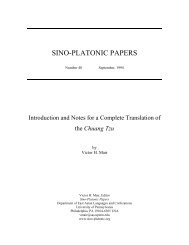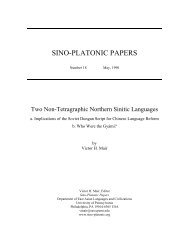Essays on Writing and Language in Honor - Sino-Platonic Papers
Essays on Writing and Language in Honor - Sino-Platonic Papers
Essays on Writing and Language in Honor - Sino-Platonic Papers
Create successful ePaper yourself
Turn your PDF publications into a flip-book with our unique Google optimized e-Paper software.
Schn'ftfatsch~iift: &says it1 Horwr of John &Francis<br />
does <strong>on</strong>e reward the effort? Or does <strong>on</strong>e judge the proficiency? Students somehow<br />
believe that hard work - whatever the results -- should be rewarded. My own<br />
resp<strong>on</strong>se as a teacher is to ate the reality pr<strong>in</strong>aple: not all hard work is recognized,<br />
nor does all hard work bear fruit. My resp<strong>on</strong>sibility is to encourage hard work, but<br />
unfortunately hard work does not always produce the best results.<br />
In this regard, I believe that st<strong>and</strong>ardized proficiency tests, either the written<br />
tests or the ACTFL-sp<strong>on</strong>sored oral tests, can free the classroom teacher to use the<br />
grades more flexibly. I often c<strong>on</strong>sidered the possibility of suggest<strong>in</strong>g to Institute<br />
<strong>in</strong>structors a grade based solely <strong>on</strong> effort, regardless of progress - or a comb<strong>in</strong>ati<strong>on</strong> of<br />
effort <strong>and</strong> achievement as a basis for a grade. Doubtless, some of you explicitly or<br />
implicitly employ some such criteria.<br />
The culture of foreign language teach<strong>in</strong>g <strong>in</strong>volves due c<strong>on</strong>siderati<strong>on</strong> of both<br />
the student's culture <strong>and</strong> the teacher's; the culture of foreign language teach<strong>in</strong>g<br />
rem<strong>in</strong>ds us that native teachers are not, by the very nature of their nativity,<br />
<strong>in</strong>evitably superior as teachers; the culture of foreign' language teach<strong>in</strong>g requires a<br />
dist<strong>in</strong>cti<strong>on</strong> between the native language teacher offer<strong>in</strong>g himself as an example of<br />
the culture <strong>and</strong> offer<strong>in</strong>g himself as the model of his native culture. The culture of<br />
foreign language teach<strong>in</strong>g regards teach<strong>in</strong>g as an acquired skill, not as a natural<br />
endowment: <strong>on</strong>e's success as a teacher depends <strong>on</strong> <strong>in</strong>st<strong>in</strong>ct, skill, <strong>and</strong> sensitivity, not<br />
<strong>on</strong> the place of <strong>on</strong>e's birth.<br />
The learn<strong>in</strong>g of culture does not always depend <strong>on</strong> the effort <strong>in</strong>vested. I<br />
how colleagues who know a great deal about Ch<strong>in</strong>ese history <strong>and</strong> Ch<strong>in</strong>ese<br />
literature, who d<strong>on</strong>'t have any sense of what Ch<strong>in</strong>ese culture means. I can count<br />
<strong>on</strong> the f<strong>in</strong>gers of <strong>on</strong>e h<strong>and</strong> the American scholars of Ch<strong>in</strong>ese who truly underst<strong>and</strong><br />
the essence of Ch<strong>in</strong>ese culture. Clearly, the American teacher of Ch<strong>in</strong>ese <strong>in</strong> my<br />
sec<strong>on</strong>d story, the <strong>on</strong>e who called at the office, knew noth<strong>in</strong>g of the essence of<br />
Ch<strong>in</strong>ese culture. The facts of culture - dates, history, names, texts, words - these<br />
can be enumerated, which is why so many language courses measure levels by the<br />
number of words "covered" <strong>in</strong> a semester - whatever that means. But does merely<br />
memoriz<strong>in</strong>g a list of historical facts, <strong>and</strong> recogniz<strong>in</strong>g a number of cultural artifacts,<br />
c<strong>on</strong>stitute functi<strong>on</strong>al comm<strong>and</strong> of a language or an authentic underst<strong>and</strong><strong>in</strong>g of its<br />
traditi<strong>on</strong>s?<br />
As difficult as it is for students to learn these uncomm<strong>on</strong>ly taught languages,<br />
I th<strong>in</strong>k we sometimes make it even more difficult. In the East Asian Summer<br />
<strong>Language</strong> Institute <strong>on</strong>e year, an <strong>in</strong>structor accustomed to teach<strong>in</strong>g beg<strong>in</strong>n<strong>in</strong>g<br />
Ch<strong>in</strong>ese assumed c<strong>on</strong>trol of an advanced Ch<strong>in</strong>ese course. All summer l<strong>on</strong>g, what<br />
the students learned - to every<strong>on</strong>e's dismay - was what words <strong>and</strong> c<strong>on</strong>structi<strong>on</strong>s<br />
covered <strong>in</strong> First- <strong>and</strong> Sec<strong>on</strong>d-year Ch<strong>in</strong>ese they should have learned. Over <strong>and</strong> over<br />
aga<strong>in</strong>, the <strong>in</strong>structor <strong>in</strong> the Fourth-year Ch<strong>in</strong>ese class would tell her students <strong>in</strong><br />
dismay, ''This c<strong>on</strong>structi<strong>on</strong> you should have learned <strong>in</strong> first- or sec<strong>on</strong>d-year<br />
Ch<strong>in</strong>ese!" By the end of the summer, those fourth-year students became experts at<br />
identify<strong>in</strong>g the words <strong>and</strong> phrases they had failed to learn <strong>in</strong> beg<strong>in</strong>n<strong>in</strong>g Ch<strong>in</strong>ese.<br />
I've often w<strong>on</strong>dered about the perverse burden placed <strong>on</strong> foreign language students<br />
- not <strong>on</strong>ly do they have to learn the language, but they have to remember which<br />
words <strong>and</strong> which c<strong>on</strong>structi<strong>on</strong>s were learned <strong>in</strong> which grades! Even a native<br />
doesn't have to do that. What that particular fourth-year <strong>in</strong>structor was teach<strong>in</strong>g


